
EPINITRIL 10 mg/24 H TRANSDERMAL PATCHES
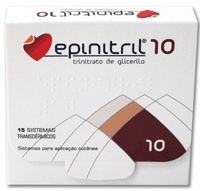

How to use EPINITRIL 10 mg/24 H TRANSDERMAL PATCHES
Translated with AI
This page provides general information and does not replace a doctor’s consultation. Always consult a doctor before taking any medication. Seek urgent medical care if symptoms are severe.
Show originalContents of the leaflet
Introduction
PACKAGE LEAFLET: INFORMATION FOR THE USER
Epinitril 10 mg/24 h transdermal patch
Glyceryl trinitrate
Read all of this leaflet carefully before you start using this medicine because it contains important information for you.
- Keep this leaflet, you may need to read it again.
- If you have any further questions, ask your doctor or pharmacist.
- This medicine has been prescribed for you only. Do not pass it on to others. It may harm them, even if their signs of illness are the same as yours.
- If you get any side effects, talk to your doctor or pharmacist. This includes any possible side effects not listed in this leaflet. See section 4.
Contents of the pack:
- What is Epinitril and what is it used for
- What you need to know before you use Epinitril
- How to use Epinitril
- Possible side effects
- Storing Epinitril
- Contents of the pack and other information
1. What is EPINITRIL and what is it used for
Epinitril patches contain the active substance glyceryl trinitrate, a vasodilator used in heart diseases and belonging to a group of drugs called organic nitrates.
Epinitril patches are applied to the skin and the active substance will then pass continuously through the skin and into the body.
Epinitril is indicated for the preventive treatment of angina pectoris taken alone or in combination with other anti-anginal treatment.
Angina usually presents as chest pain or oppression, although it may be felt in the neck or arm.
The pain occurs when the heart is not sufficiently oxygenated. Epinitril is not indicated for the treatment of acute attacks. Use your sublingual tablet or spray for the treatment of acute attacks.
Epinitril patches are for external use only.
2. What you need to know before you use EPINITRIL
Do not useEpinitril:
- if you are allergic (hypersensitive) to glyceryl trinitrate, related organic nitrates or any of the other components of this medicine (listed in section 6);
- if you have or have recently had a collapse associated with hypotension;
- if you suffer from headache, vomiting or convulsions associated with increased intracranial pressure, including those caused by head trauma;
- if you suffer from cardiac failure due to obstruction, for example, in the presence of a narrowing of the aortic orifice or the atrioventricular orifice of the heart (aortic stenosis or mitral stenosis, respectively) or a fibrotic thickening of the thin membrane that covers the heart (constrictive pericarditis);
- if you are taking medicines for the treatment of erectile dysfunction (e.g., sildenafil or any other PDE-5 inhibitor). Nitrates should not be administered to patients treated with sildenafil or any other medicine used to treat erectile dysfunction. Patients currently treated with nitrates should not take sildenafil or any other medicine for the treatment of erectile dysfunction. The combination of a nitrate with sildenafil or any other PDE-5 inhibitor can cause a profound and sudden reduction in blood pressure, which can produce fainting, loss of consciousness or even a heart attack (see also “Do not use Epinitril”);
- if you are taking riociguat, a soluble guanylate cyclase stimulator,
- if you suffer from severe hypotension (blood pressure less than 90 mmHg),
- if you suffer from severe hypovolemia (reduced blood volume) due to blood loss or fluid loss,
- if you suffer from severe anemia,
- if you suffer from toxic pulmonary edema.
Warnings and precautions
Consult your doctor or pharmacist before starting to use Epinitril:
- if you are withdrawing from treatment. Withdrawal from Epinitril treatment should be gradual, replacing it with decreasing doses of long-acting oral nitrates;
- if you need to undergo magnetic resonance imaging, electrical stimulation of the heart to restore a normal heart rhythm (defibrillation or cardioversion) and before heat treatment (diathermy). Remove the Epinitril patches before undergoing these treatments;
- if you have or have recently had a heart attack (myocardial infarction) or if symptoms of heart failure appear rapidly (acute heart failure) such as difficulty breathing, feeling very tired, swelling of the legs. Your doctor may request laboratory tests of your cardiovascular functions;
- if you suffer from severe hypotension during Epinitril treatment, the patch should be removed. In case of collapse or shock, the patch must be removed;
- if you experience a chest pain (acute angina attack) or if your heart is not pumping enough blood and oxygen (unstable angina) or in case of a heart attack (myocardial infarction), Epinitril should not be used as an immediate treatment;
- if you suffer from severe headache or low blood pressure (hypotension). This can occur if the initial dose is too high. It is advisable to gradually increase the dose until the optimal effect is achieved;
- if you are taking other nitrates or sublingual glyceryl trinitrate, because your body may develop resistance to the effects of these substances after repeated exposure (cross-tolerance);
- if you suffer from or have suffered from abnormal low blood pressure caused by glyceryl trinitrate. In this case, you may suffer from a low heart rate (paradoxical bradycardia) and increased angina;
- if you suffer from optic nerve disease (angle-closure glaucoma);
- if you have insufficient oxygenation of the blood (hypoxemia) due to severe anemia or lung disease or reduced blood flow to the heart (ischemic heart failure); patients with these medical problems may suffer from an imbalance in the ventilation/perfusion ratio, which is an index of respiratory function. In these patients, glyceryl trinitrate may worsen this imbalance and cause a decrease in blood oxygenation;
- if angina has been caused by heart thickening (hypertrophic cardiomyopathy). Nitrates can worsen this type of angina;
- if you experience an increased frequency of angina attacks during patch-free periods. Your doctor may want to re-evaluate your coronary disease and consider adjusting the treatment.
- treatment should be suspended and you should consult your doctor if you experience skin sensitization phenomena (itching, burning, inflammation).
Using Epinitril with other medicines
Concomitant administration of medicines for the treatment of erectile dysfunction (e.g., sildenafil or any other PDE-5 inhibitor) enhances the blood pressure-reducing effects of nitrates and should therefore be avoided (see also “Do not use Epinitril”).
Concomitant treatment with riociguat, a soluble guanylate cyclase stimulator, should be avoided, as simultaneous use may cause hypotension (see also “Do not use Epinitril”).
Concomitant treatment with
- medicines used to lower blood pressure, such as calcium antagonists, ACE inhibitors (for the treatment of congestive heart failure), beta-blockers (used to prevent cardiac arrhythmias), diuretics (increase water excretion from the body), and other antihypertensives,
- tricyclic antidepressants (medicines used to treat depression),
- neuroleptics (medicines used to prevent psychosis),
- major tranquilizers (sedatives), as well as alcohol consumption and in combination with amifostine (cytoprotective medicine in chemotherapy and radiotherapy),
- acetylsalicylic acid (an NSAID),
may enhance the blood pressure-reducing effects of Epinitril.
Concomitant treatment with dihydroergotamine may reduce the effect of Epinitril.
Non-steroidal anti-inflammatory medicines, except for acetylsalicylic acid, may reduce the therapeutic response to Epinitril.
Tell your doctor or pharmacist that you are using, have recently used, or may need to use any other medicine.
Pregnancy, breastfeeding, and fertility
Epinitril should not be used during pregnancy, especially during the first three months, unless your doctor has indicated it.
Since there is almost no information on whether glyceryl trinitrate is excreted in breast milk, a risk during breastfeeding cannot be excluded. Your doctor will assess whether you should interrupt breastfeeding or Epinitril treatment.
There are no data on the effect of Epinitril on human fertility.
If you are pregnant or breastfeeding, think you may be pregnant, or plan to become pregnant, consult your doctor or pharmacist before using this medicine.
Driving and using machines
Especially at the beginning of treatment, or during dose adjustment, Epinitril may affect your ability to drive or use machines, reduce your reaction ability, or rarely cause orthostatic hypotension and dizziness, as well as exceptionally, syncope after overdose.
If you experience these effects, you should avoid driving or using machines.
3. How to use EPINITRIL
Follow exactly the administration instructions of this medicine indicated by your doctor. In case of doubt, consult your doctor or pharmacist again.
The recommended dose is one Epinitril patch once a day. Apply the patch to the skin carefully and keep it on for 12-16 hours. Then, remove the patch and maintain a patch-free period during the remaining 8-12 hours.
You should change your Epinitril patch according to the instructions given by your doctor. Your doctor will tell you how long to keep the patch on the skin and the duration of the patch-free interval.
Use in children and adolescents
Epinitril should not be used in children or adolescents under 18 years of age.
How long to use Epinitril
Treatment with Epinitril may continue for several years; however, your doctor will want to see you periodically to decide whether to continue treatment or modify the therapeutic regimen.
How to apply the patch
Apply the patch to clean, dry skin, but not on cuts, spots, or defects, or on areas where you have just applied cream, moisturizer, or talcum powder. It is recommended to apply Epinitril transdermal patches to the skin of the chest (see Figure 1) or the upper outer arm, free from redness or irritation, and rotate the application points. If necessary, you can shave the area. Avoid areas that form folds or are subject to friction during movement.
Figure 1
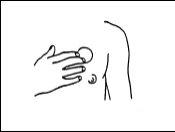
Do not apply two consecutive patches to the same place.
Apply an Epinitril patch to the skin as soon as you remove it from the pouch, as follows:
(I) Break the pouch along the dotted line.
Do not use scissors (see Figure 2).
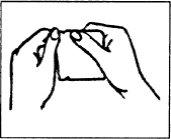
Figure 2
(II) Hold the patch between your thumb and index finger by the removable label (see Figure 3).
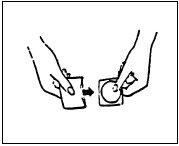
Figure 3
(III) Remove the protective covering with your other hand (see Figure 4). Do not touch the sticky side of the patch; otherwise, it will not stick well.
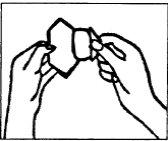
Figure 4
(IV) Apply the open part of the patch to the skin and remove the remaining protective covering.
Press firmly for about 10 seconds over the entire surface of the patch. Run your fingers over the edges to make sure they stick well.
Wash your hands before and after applying Epinitril.
To remove a patch, lift the edge and gently pull the patch off. After using the patch, fold it in half, with the sticky side inward, and throw it away, where children cannot reach it.
What to do if the patch falls off
If Epinitril is applied correctly, it is very unlikely that the patch will fall off. However, if the patch falls off, replace it with a new one and then change the patch again according to your original schedule.
If you use more Epinitril than you should
If high doses of glyceryl trinitrate are administered, you may experience severe hypotension and reflex tachycardia or collapse and syncope, as well as alteration of hemoglobin (methemoglobinemia). If too many patches are applied at the same time, the patches should be carefully removed and the skin underneath should be washed thoroughly to reduce absorption. In case of hypotension or collapse, it is recommended to elevate the patient's legs or, if necessary, apply a compressive bandage to the legs.
In case of overdose, inform your doctor immediately, contact the nearest emergency service or call the Toxicology Information Service, phone 91 562 04 20, indicating the medicine and the amount used. Show your doctor the medicine or the empty package.
If you forget to change the patch
If you forget to change the patch at the right time, you should replace it as soon as possible and then follow your original schedule to apply the next patch.
If you stop treatment with Epinitril
When stopping treatment with Epinitril, you may experience angina attacks again.
If you have any other questions about the use of this medicine, ask your doctor or pharmacist.
4. Possible side effects
Like all medicines, Epinitril can cause side effects, although not everybody gets them.
The following side effects have been reported:
Very common side effects (occurring in more than 1 in 10 patients):
- Nausea.
- Vomiting.
Common side effects (occurring in more than 1 in 100 patients but less than 1 in 10):
- Headache.
Uncommon side effects (occurring in more than 1 in 1,000 patients but less than 1 in 100):
- Contact dermatitis.
- Redness and irritation at the patch application site.
- Itching.
- Burning sensation.
Rare side effects (occurring in more than 1 in 10,000 patients but less than 1 in 1,000):
- Tachycardia.
- Orthostatic hypotension (drop in blood pressure when standing up), may be described as transient episodes of dizziness.
- Redness of the skin.
- Increased heart rate.
Very rare side effects (occurring in less than 1 in 10,000 patients):
- Dizziness.
- Syncope.
Side effects of unknown frequency:
- Cardiac disorders (palpitations).
- Generalized skin rash.
If you experience side effects, consult your doctor or pharmacist, even if it is a side effect not listed in this leaflet.
Reporting side effects
If you experience any side effects, consult your doctor or pharmacist. This includes any possible side effects not listed in this leaflet. You can also report them directly through the Spanish Medicines Monitoring System for Human Use www.notificaRAM.es.
By reporting side effects, you can help provide more information on the safety of this medicine.
.
5. Storing EPINITRIL
Keep this medicine out of the sight and reach of children.
Do not store above 25°C. Epinitril should be stored in its intact pouch.
Do not use this medicine after the expiry date which is stated on the packaging and pouch after EXP. The expiry date is the last day of the month shown.
Medicines should not be disposed of via wastewater or household waste. Dispose of the packaging and any unused medicine in the SIGRE collection point at your pharmacy. Ask your pharmacist how to dispose of the packaging and any unused medicine. This will help protect the environment.
6. Contents of the pack and other information
Composition of Epinitril
The active substance of Epinitril patches is glyceryl trinitrate and they are available in three concentrations: Epinitril 5mg/24h, 10 mg/24h, and 15 mg/24h.
Epinitril 10 mg/24 h: contains 31.37 mg of the active substance glyceryl trinitrate and releases approximately 10 mg of glyceryl trinitrate per day (0.4 mg/h); the patch release area is 12.75 cm2. The identification code printed on the backing layer is NR10.
The other components are an adhesive substance (acrylate-vinyl acetate copolymer), a tackifier (hydroabietyl phthalate), and a cross-linking agent (polybutyl titanate), which have been spread together with the active substance on a backing layer (lacquered polypropylene film). The adhesive layer is covered by a protective coating of aluminum and silicon on both sides, which is removed before use.
Appearance of the product and package contents
Epinitril is a transdermal patch with an adhesive backing. Each patch is individually sealed in a protective envelope.
Package sizes: 15 and 30 patches. Not all package sizes may be marketed.
Marketing authorization holder and manufacturer
Marketing authorization holder
Viatris Healthcare Limited
Damastown Industrial Park
Mulhuddart, Dublin 15
Dublin
Ireland
Manufacturer
ROTTAPHARM Ltd.
Damastown, Industrial Park, Mulhuddart
Dublin 15
Ireland.
Or
LTS Lohmann Therapie Systeme AG
Lohmannstraße 2
56626 Andernach
Germany
For further information on this medicinal product, please contact the local representative of the marketing authorization holder:
Viatris Pharmaceuticals, S.L.
C/ General Aranaz, 86
28027 - Madrid
Spain
Date of last revision of this leaflet:December 2022
Detailed and updated information on this medicinal product is available on the website of the Spanish Agency for Medicines and Health Products (AEMPS) http://www.aemps.gob.es/
- Country of registration
- Average pharmacy price15.42 EUR
- Active substance
- Prescription requiredYes
- Manufacturer
- This information is for reference only and does not constitute medical advice. Always consult a doctor before taking any medication. Oladoctor is not responsible for medical decisions based on this content.
- Alternatives to EPINITRIL 10 mg/24 H TRANSDERMAL PATCHESDosage form: TRANSDERMAL PATCH, 37.4 mg nitroglycerinActive substance: glyceryl trinitrateManufacturer: Merus Labs Luxco Ii S.À.R.L.Prescription requiredDosage form: TRANSDERMAL PATCH, 18.7 mg nitroglycerinActive substance: glyceryl trinitrateManufacturer: Merus Labs Luxco Ii S.À.R.L.Prescription requiredDosage form: TRANSDERMAL PATCH, 31.37 mgActive substance: glyceryl trinitrateManufacturer: Casen Recordati S.L.Prescription required
Online doctors for EPINITRIL 10 mg/24 H TRANSDERMAL PATCHES
Discuss questions about EPINITRIL 10 mg/24 H TRANSDERMAL PATCHES, including use, safety considerations and prescription review, subject to medical assessment and local regulations.
Frequently Asked Questions











